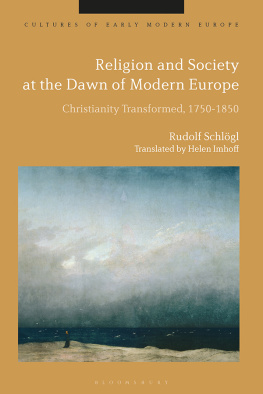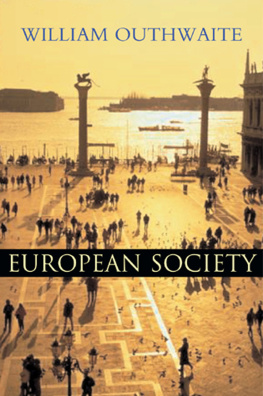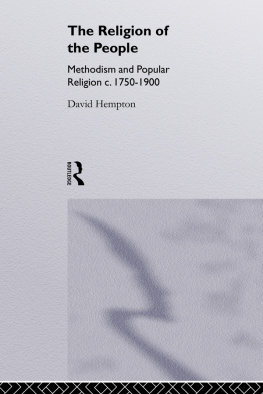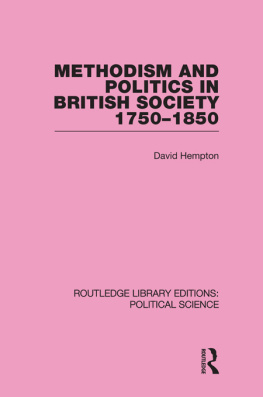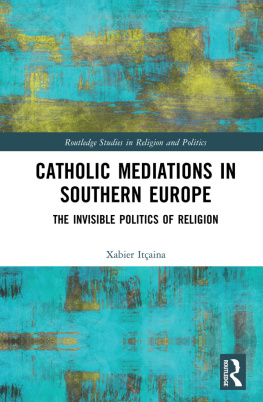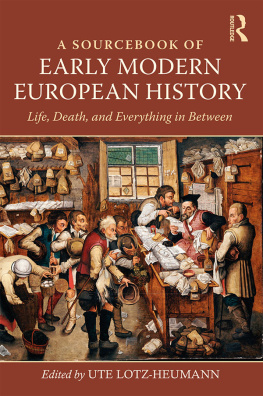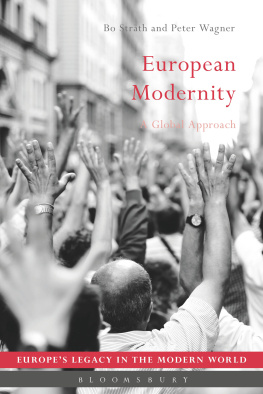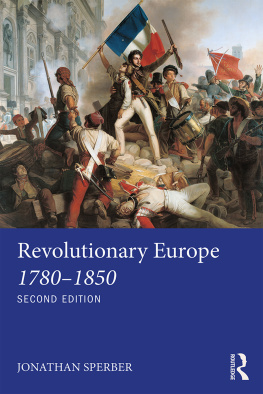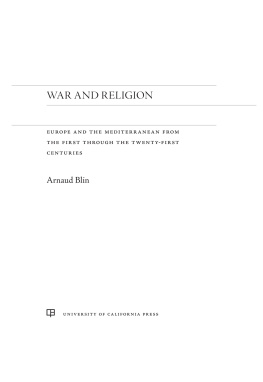Religion and Society at the Dawn of Modern Europe
Cultures of Early Modern Europe
Series Editors: Beat Kmin, Professor of Early Modern European History, University of Warwick, and Brian Cowan, Associate Professor and Canada Research Chair in Early Modern British History, McGill University
Editorial Board:
Adam Fox, University of Edinburgh, UK
Robert Frost, University of Aberdeen, UK
Molly Greene, University of Princeton, USA
Ben Schmidt, University of Washington, USA
Gerd Schwerhoff, University of Dresden, Germany
Francesca Trivellato, University of Yale, USA
Francisca Loetz, University of Zurich, Switzerland
The cultural turn in the humanities has generated a wealth of new research topics and approaches. Focusing on the ways in which representations, perceptions and negotiations shaped peoples lived experiences, the books in this series provide fascinating insights into the past. The series covers early modern culture in its broadest sense, inclusive of (but not restricted to) themes such as gender, identity, communities, mentalities, emotions, communication, ritual, space, food and drink, and material culture.
Published:
Food and Identity in England, 15401640, Paul S. Lloyd (2014)
The Birth of the English Kitchen, 16001850, Sara Pennell (2016)
Vagrancy in English Culture and Society, 16501750, David Hitchcock (2016)
Angelicas Book and the World of Reading in Late Renaissance Italy, Brendan Dooley (2016)
Gender, Culture and Politics in England, 15601640, Susan D. Amussen and David E. Underdown (2017)
Food, Religion, and Communities in Early Modern Europe, Christopher Kissane (2018)
Religion and Society at the Dawn of Modern Europe, Rudolf Schlgl (2020)
Religion and Society at the Dawn of Modern Europe
Christianity Transformed, 17501850
Rudolf Schlgl
Translated by
Helen Imhoff
The period from 1750 to 1850 was marked by profound social changes in central and western Europe, affecting political institutions as well as the basic processes by which society was formed.
Thus I am not concerned with the history of the individual churches in Europe,
The academic disciplines of secular and ecclesiastical history have each viewed the subject of religion from different perspectives. As a rule, church history focuses on questions of institutional and ecclesiastical organization, in most cases ignoring the history of individual piety. As a result, society only makes an appearance in contexts where it functions as a counterpart to religion and is only relevant when ecclesiastical institutions address social problems or when secular politics deal with questions relating to religious life. In addition to this, church history tends to approach its subject matter from the point of view of one particular confessional church, either ignoring others or treating them in a generalized way as one group.
For reasons that go beyond the scope of this introductory discussion, I decided to adopt the communications- and media-theoretical approaches that systems theory offers as a conceptual basis of my analysis. Systems theory seems to me to offer the clearest set of terms to address the following core questions relating to society: how does society succeed in organizing itself through different categories of meaning and how does society guarantee the stability of this order? Systems theory assumes that social phenomena continuously reproduce themselves, and it thus does away with the idea that the stability and reproduction of patterns of social order result from the motives and interests of individuals, an idea which, in any case, is implausible, as a brief consideration of ones own actions shows. Moreover, systems theory takes into account that the particular characteristics and actions of individuals, groups and institutions are determined by their relationship to other people, groups and institutions; none of these, therefore, occur in isolation from one another. These relationships follow certain delineable patterns in a given historical context. Consequently, there are convincing arguments that a solid theoretical basis is necessary in order to examine questions relating to society.
In addition to this, systems theory explicitly considers reality to be the result of observations. No one knows what the world is like beyond our own observations, a circumstance which also applies to academic examination of the world. When engaging in such academic observation, one must, therefore, take into account the fact that the subject of observation is not a pre-existing, given social world, but that social reality is created and structured by observations and communication*. This is the approach I will be taking in examining how Christianity emerges and is shaped as a system within society. This requires a set of terms that offer the distinctions necessary to describe the production of a meaningful, structured social reality; they include the following: meaning, communication, observation, media, system, environment, semantics, descriptions from within a given system (self-descriptions) and those that are undertaken from the outside (external descriptions), differentiation* and complexity. I will make use of these concepts without necessarily using these exact terms and without engaging in any in-depth discussion of them.
A glossary is provided at the end of this book for various terms, and the terms contained in it are indicated by an asterisk in the main text when they are first used.
For this reason, systems theory advocates applying a functional analysis to social constellations and phenomena. Contrary to what is often claimed, the point of this is not to tie social events to particular interests; instead, systems theory assumes that function cannot be explained by intentions and interests and in extreme cases may not be reflected in these. One reason why social configurations, from relationships between two people to entire societies, are stable is because as a whole, and certainly from the point of view of individual participants, they cannot achieve an understanding of themselves. It is for this reason that the overall structure of such an entity is stable: since the nineteenth century, social theories have used the term ideology to describe this circumstance.
Focusing on the function of social events and configurations has a further advantage: it identifies social phenomena as a response and resolution to certain problems and thus it allows one to look for other possible and equivalent resolutions, in turn making it possible to compare the consequences of such possibilities. This sheds light on the variety of social phenomena and the different forms of developmental logic they often follow despite identical initial situations. Compared to the normative concept of ideology, an approach focused on an analysis of function has the advantage of doing away with any notion of teleology.
At first glance, religion is a phenomenon that relates to individuals, and Protestantism has been concerned with an individuals relationship to God ever since the Reformation. More generally, religion enables individuals to give mundane events meaning by placing them within the context of the infinite, as Schleiermacher argued. Deriving meaning from religion in this way thus leads to a particular kind of relationship between the individual and the world and to the individual viewing themselves in a particular way. Ethnological research suggests that, in the early phases of social development, religion had the function of giving meaning to the unfamiliar and unexpected, thus accommodating it within the familiar world. This illustrates the circular nature of the basis of social order: a phenomenon or an event can only be unexpected if there are also events that do fulfil certain expectations;

